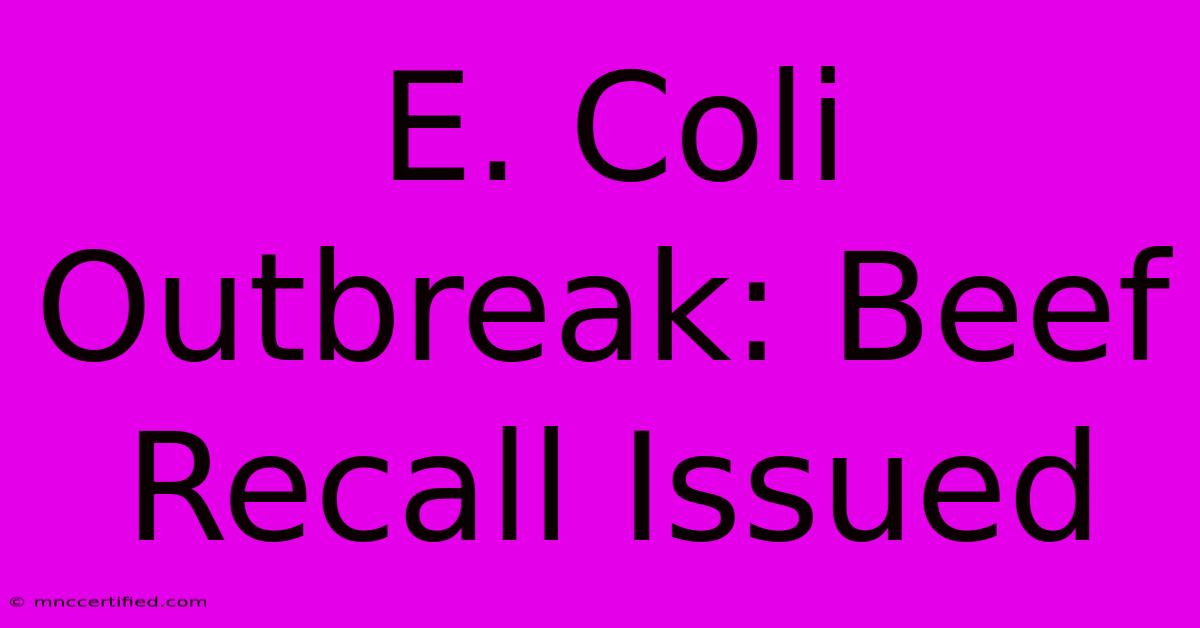E. Coli Outbreak: Beef Recall Issued

Table of Contents
E. Coli Outbreak: Beef Recall Issued – What You Need to Know
An E. coli outbreak linked to contaminated beef has resulted in a significant recall, impacting consumers and the food industry alike. Understanding the situation, the risks, and preventative measures is crucial. This article provides comprehensive information on the current E. coli outbreak and the associated beef recall.
Understanding the E. coli Outbreak
E. coli, short for Escherichia coli, is a type of bacteria commonly found in the intestines of humans and animals. While most strains are harmless, some, like Shiga toxin-producing E. coli (STEC), can cause severe foodborne illness. These strains can lead to symptoms ranging from mild diarrhea to life-threatening complications like hemolytic uremic syndrome (HUS). HUS is particularly dangerous, especially for young children and the elderly.
This specific outbreak is linked to contaminated beef products from [Insert Name of Company/Brand Here, if known]. The source of contamination is still under investigation, but potential sources include fecal contamination during processing or improper handling practices along the supply chain. It's vital to emphasize that not all beef is affected; only specific products included in the recall.
Identifying Recalled Beef Products
The recalled beef products will have specific identifying information, such as:
- Establishment number: This number, usually found on the product label, identifies the processing plant. The specific establishment number involved in this recall is [Insert Establishment Number Here, if known].
- Product name and description: The exact name and description of the recalled products will be detailed in the official recall notice issued by [Relevant Government Agency, e.g., USDA, FDA].
- Use-by/Sell-by dates: These dates are crucial in identifying potentially contaminated products. Check the label carefully.
Always refer to the official recall notice from the relevant government agency for the most accurate and up-to-date list of recalled products. This information will likely be available on their website and through press releases.
Symptoms of E. coli Infection
Symptoms of E. coli infection typically appear within 2-10 days of consuming contaminated food and can include:
- Diarrhea (often bloody): This is a common and significant symptom.
- Stomach cramps: Severe abdominal pain is also frequently reported.
- Vomiting: Nausea and vomiting can accompany other symptoms.
- Fever: While not always present, fever can indicate a more severe infection.
If you experience these symptoms after consuming beef, seek immediate medical attention, especially if you notice bloody diarrhea or severe abdominal pain.
Preventing E. coli Infection
Practicing safe food handling techniques is crucial in preventing E. coli infection:
- Thorough cooking: Ensure beef is cooked to an internal temperature of at least 160°F (71°C) to kill harmful bacteria. Use a food thermometer to verify.
- Proper handwashing: Wash your hands thoroughly with soap and water before and after handling raw meat.
- Safe food storage: Refrigerate beef promptly and avoid cross-contamination by keeping raw meat separate from other foods.
- Cleanliness: Maintain a clean kitchen environment, regularly disinfecting surfaces that come into contact with raw meat.
What to Do if You Have Recalled Beef
If you have purchased beef that is included in the recall, do not consume it. Follow the instructions provided in the official recall notice. This typically involves returning the product to the store for a refund or disposing of it properly.
Staying Informed
For the most accurate and up-to-date information on the E. coli outbreak and beef recall, regularly check the websites of relevant government agencies such as the [Relevant Government Agency, e.g., USDA, FDA]. News outlets and official press releases will also provide important updates.
This information is for general knowledge and informational purposes only, and does not constitute medical advice. Always consult with a healthcare professional for any health concerns.
Keywords:
E. coli outbreak, beef recall, food poisoning, food safety, contaminated beef, Shiga toxin-producing E. coli (STEC), hemolytic uremic syndrome (HUS), foodborne illness, USDA recall, FDA recall, food handling, safe cooking temperature, preventing E. coli, recall notice, symptoms of E. coli, bloody diarrhea, stomach cramps, vomiting, fever.
(Note: Replace bracketed information with the actual details of the specific recall.)

Thank you for visiting our website wich cover about E. Coli Outbreak: Beef Recall Issued. We hope the information provided has been useful to you. Feel free to contact us if you have any questions or need further assistance. See you next time and dont miss to bookmark.
Featured Posts
-
Does Dental Insurance Cover Byte
Nov 22, 2024
-
Julian Lewis Colorado Bound
Nov 22, 2024
-
Juventus Vs Arsenal Womens Champions League
Nov 22, 2024
-
Msi Insurance Credit Card Charge
Nov 22, 2024
-
Simple Save Usa Insurance Review
Nov 22, 2024